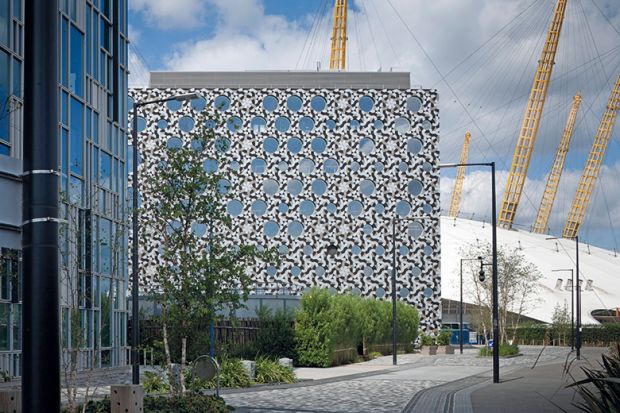With campus buildings often underused during the working week – let alone the long summer break – universities are frequently urged to “sweat” their costly estates where possible.
However, the problem of using expensive university buildings more efficiently has been thrown into sharp relief by a staff revolt at a leading London design school over plans to extend teaching to as late as 7.30pm.
Under the proposed move to a two-shift timetable in September, teaching would begin at Ravensbourne at 9am – as opposed to the current 10am start – for some students, while others on a later shift would start in the afternoon, but not finish until 7.30pm.
In a letter to governors signed by about 70 Ravensbourne academics and administrators, staff point out that this would require many teachers to be on site by 8am to prepare for an early lecture.
With most staff living at least an hour away from Ravensbourne’s £70 million campus – which is next to the O2 Arena on the Greenwich peninsula – 9am is a “difficult start time”, especially for staff and students with family responsibilities, the letter observes.
“Students and staff finishing at 7.30pm are unlikely to be out of the building before 8pm [because of the] inevitable questions and admin at the end of classes,” which would mean that staff would arrive home between 9pm and 9.30pm or possibly much later, the letter adds.
“Placing the students and staff into the heart of the rush hour with the morning shift will inevitably mean significantly longer journey times,” the letter adds, concluding that the shift system “belongs in the Victorian factory, not a modern learning environment”.
Gary Pritchard, dean of Ravensbourne’s School of Media, said that the college took the concerns of its staff and students “extremely seriously”, but was examining a revised timetable “to ensure that our RIBA award-winning building is used as efficiently as possible to provide the best student experience we can".
“We want to ensure that we continue to deliver learning that keeps our students at the forefront of creative industry thinking and part of this is looking at our building and the structure of teaching and learning within it,” he said.
Addressing whether university campuses should become more accessible round the clock, Sue Holmes, former chair of the Association of University Directors of Estates, said that student expectations in this area were “evolving”, adding that it is “important that those seeking higher education are able to work whenever and wherever it suits them”.
“It is our job as estates and facilities teams to meet these expectations, and providing 24-hour access is a key part of this,” said Ms Holmes, who is director of estates and facilities management at Oxford Brookes University.
However, universities’ top priority should be providing “safe and secure environments for our students and staff”, said Ms Holmes, adding that 24-7 access required “significant investment” as well as “efficient management of resources".
Register to continue
Why register?
- Registration is free and only takes a moment
- Once registered, you can read 3 articles a month
- Sign up for our newsletter
Subscribe
Or subscribe for unlimited access to:
- Unlimited access to news, views, insights & reviews
- Digital editions
- Digital access to THE’s university and college rankings analysis
Already registered or a current subscriber? Login








